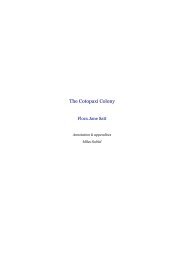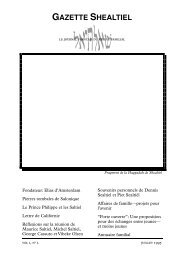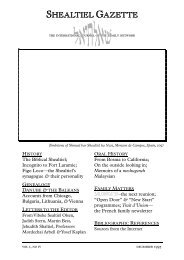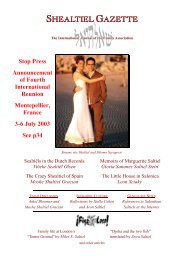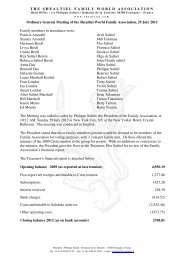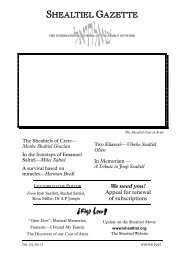please click here for his presentation - The Shealtiel Family Worldwide
please click here for his presentation - The Shealtiel Family Worldwide
please click here for his presentation - The Shealtiel Family Worldwide
You also want an ePaper? Increase the reach of your titles
YUMPU automatically turns print PDFs into web optimized ePapers that Google loves.
Takanot Candia<br />
would be transferred to a Capsali trust. No one of the <strong>Shealtiel</strong> Hen name appears as cosignatory to<br />
that agreement. Was it a precursor to the Escutcheon controversy<br />
<strong>The</strong> mitzvah (commandment 2 ) of prenuptial bathing in the Mikveh was an important ritual <strong>for</strong> the<br />
bride. Apparently some community functionaries, ranging from the cantor to the caretakers, were<br />
accustomed to being tipped by the users. At some point, voluntary giving by the bride gave way to<br />
highhanded extortion by the functionary, to such a degree that some poor brides, unable to pay up,<br />
were prohibited from per<strong>for</strong>ming the ritual. Yehudah Hen was one of three rabbis who ruled (about<br />
1530) that under no circumstances was the Mikveh to be closed to brides.<br />
It is apparent from many of the rulings that the community was under ever-increasing Christian<br />
influence and falling, more and more, into a lax mode of communal life: spending fast-days, such as<br />
the 9th of Av, playing cards at home rather than worshipping at a synagogue; using the courthouses<br />
<strong>for</strong> litigation even on holidays; attempting to conduct marriage ceremonies in the synagogue at times<br />
prohibited by law. Another new habit that alarmed the religious leadership was an increasing number<br />
of cases in which parents were bribed to break off their children’s betrothals, irrespective of the<br />
degree of emotional attachment binding the engaged couple. Yehudah Hen’s two sons, the rabbis<br />
Isaac and Israel, were very active in those religious rulings.<br />
On 22 April 1566, the brothers were on the board that prohibited such fiscal solicitation of the<br />
breaking of engagements, and, in another matter (but in the same publication), warned against<br />
<strong>for</strong>ging the kosher emblem on cheeses made by Gentiles so as to pass them off as fit <strong>for</strong> consumption<br />
by Jews. A year later, the brothers ordained a waiting period of a full year be<strong>for</strong>e a father could<br />
promise <strong>his</strong> daughter to a man from outside Crete. <strong>The</strong> reason <strong>for</strong> t<strong>his</strong> prohibition was a suspicion,<br />
most likely well founded, that many such men were already married and had abandoned their families<br />
abroad. <strong>The</strong> ‘heel-cooling’ period was designed to allow time <strong>for</strong> proper investigation.<br />
On 27 November 1576, Israel Hen ruled that the cantor must follow a funeral all the way to the<br />
gates of the cemetery; on 16 June 1577, he invalidated <strong>for</strong>eign ordinations. Israel explained t<strong>his</strong> ruling<br />
2 Originally, ‘good deed;’ by eventual association of ideas, ‘commandment.’<br />
- 4 -



